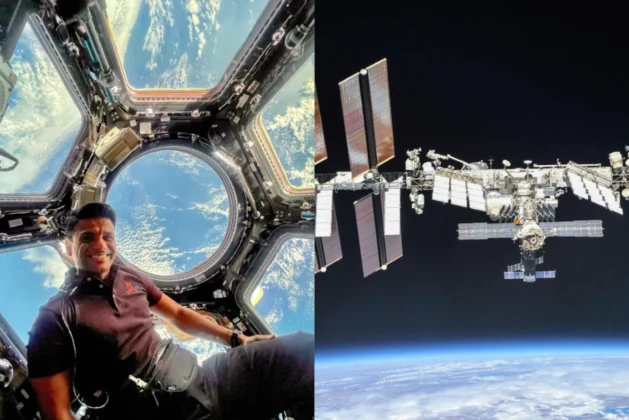“We don’t follow the Sun,” Indian astronaut Shubhanshu “Shux” Shukla addressed a captivated audience of students during a live amateur radio interaction organized by ISRO’s Northeast Space Applications Centre (NESAC).
The students submitted 20 questions to Captain Shukla, who took advantage of a 10-minute slot to contact them via amateur radio and share his experiences aboard the ISS, his astronaut training, and his efforts to stay healthy in space.
“I will come back and guide you. Many of you will become future astronauts. Stay curious, work hard, and believe in yourself; one of you might even walk on the Moon,” said Captain Shukla.
The Unique Rhythm of Life on the ISS
In response to a question about daily routines and sleep in orbit, Shukla explained, “On the ISS, we see 16 sunrises and sunsets each day because we orbit the Earth every 90 minutes. Our activities are not governed by sunlight, but by Greenwich Mean Time (GMT).”
This means that, unlike life on Earth, astronauts must adhere to planned schedules for work and sleep, rather than natural day-night cycles. Shukla explained how the human body reacts to microgravity: “Here in space, there is no gravity, but on Earth, we thrive in it. The body undergoes various changes, and adaptation takes time. At first, I suffered from some space sickness, but we quickly adapt, and there are treatments for it.”
“Microgravity causes muscle and bone loss. That’s why we exercise daily on treadmills, stationary bikes, and weight machines. Staying in shape for the mission and our return to Earth is essential,” he said.
Students from Shillong Army Public School, Alpha Higher Secondary School, Nongpoh, ARYA Vidyapith Higher Secondary School, Guwahati, The Christ Higher Secondary School, Umiam, Shriya Kendriya Primary School, Barapani, Army Public School, Umroi, and BK Bajoria School, Shillong registered for the event.
Staying Fit and Healthy in Orbit
According to Shukla, astronauts place a high value on maintaining their health. We use strength training equipment, stationary bikes, and treadmills to exercise daily because microgravity promotes bone and muscle loss. Staying fit is crucial for both the mission and our return to Earth.
Shukla also highlighted the ISS’s cutting-edge technologies. AI and robotics are essential to our goal. Our work on the Space Station is safer and more efficient because we employ robotic arms for various internal and external tasks. Shukla urged Indian students to have big dreams before they depart, saying, “I will come back and guide you.” Many of you will be astronauts in the future. Stay curious, work hard, and have faith in yourselves; you never know who might walk on the Moon.




Leave a comment